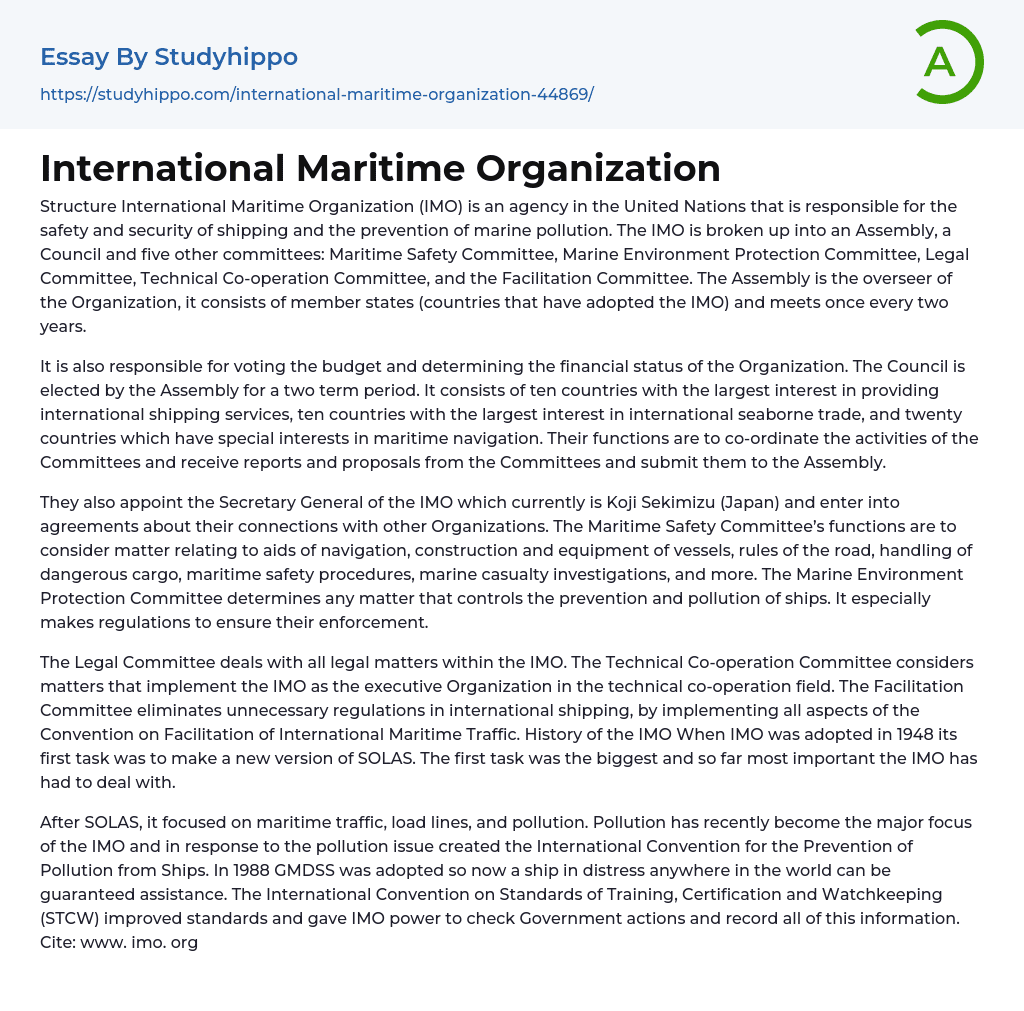The International Maritime Organization (IMO) is a United Nations agency responsible for regulating safety, security, and marine pollution prevention in shipping. It comprises multiple bodies including an Assembly, Council, and five committees: the Maritime Safety Committee, Marine Environment Protection Committee, Legal Committee, Technical Co-operation Committee, and Facilitation Committee. The Assembly convenes every two years to oversee the organization and consists of member states that have adopted the IMO.
The Council, which is elected by the Assembly for a two-term period, is in charge of voting on the budget and deciding the financial situation of the Organization. It consists of ten countries with a noteworthy stake in international shipping services, ten countries with a notable interest in international seaborne trade, and twenty countries with specific interests in maritime navigation. The Council's responsibilities include coordinating Committee activities and receiving and presenting reports and proposals fr
...om them to the Assembly.
The International Maritime Organization (IMO) selects the Secretary General, who is currently Koji Sekimizu from Japan, and forms agreements concerning their associations with other organizations. The duties of the Maritime Safety Committee include deliberating issues pertaining to navigation aids, vessel construction and equipment, navigation rules, handling dangerous cargo, safety procedures at sea, investigations of marine accidents, and more. On the other hand, the Marine Environment Protection Committee concentrates on managing prevention of ship pollution and establishes regulations for their enforcement.
The Legal Committee manages legal matters, while the Technical Co-operation Committee deals with technical co-operation. The Facilitation Committee implements regulations for international shipping. Initially, the IMO's main focus was on revising SOLAS, which is still an important task today.
The International Maritime Organization (IMO) has focused
on various aspects of maritime safety and pollution concerns. After the SOLAS agreement, the IMO shifted its attention towards maritime traffic, load lines, and pollution issues. Pollution has become a major concern for the IMO in recent times, leading to the establishment of the International Convention for the Prevention of Pollution from Ships. In 1988, the Global Maritime Distress and Safety System (GMDSS) was adopted to ensure distressed ships worldwide can receive assistance. Moreover, the introduction of the International Convention on Standards of Training, Certification and Watchkeeping (STCW) aimed to enhance standards and grant monitoring authority to the IMO over government actions while maintaining records about this information. (Source: www.imo.org)
- Federal government essays
- Armed Forces essays
- Confederate States Of America essays
- Federal Government Of The United States essays
- Fourteenth Amendment To The United States Constitution essays
- Governance essays
- Parliament essays
- Politics essays
- Jurisdiction essays
- Bureaucracy essays
- Separation Of Powers essays
- Congress essays
- President essays
- United States Congress essays
- Non-Commissioned Officer essays
- Appeal essays
- Revenge essays
- Corporate Governance essays
- Public Service essays
- Income Tax essays
- Supply essays
- Red Cross essays
- Democracy essays
- State essays
- Liberty essays
- Absolutism essays
- Reform essays
- Republic essays
- John Marshall essays
- Bourgeoisie essays
- Developed Country essays
- Elections essays
- International Relations essays
- Left-Wing Politics essays
- Monarchy essays
- Political Corruption essays
- Political Party essays
- Political Science essays
- Sovereign State essays
- United Nations essays
- World Trade Organization essays
- Contras essays
- Dictatorship essays
- Foreign policy essays
- Monarch essays
- Corruption essays
- Foreign essays
- Democratic Party essays
- European Union essays
- President Of The United States essays




